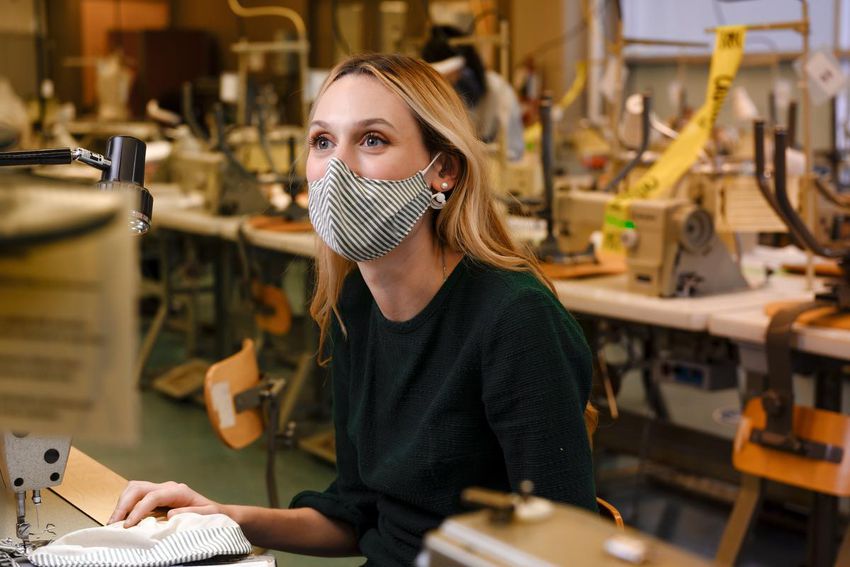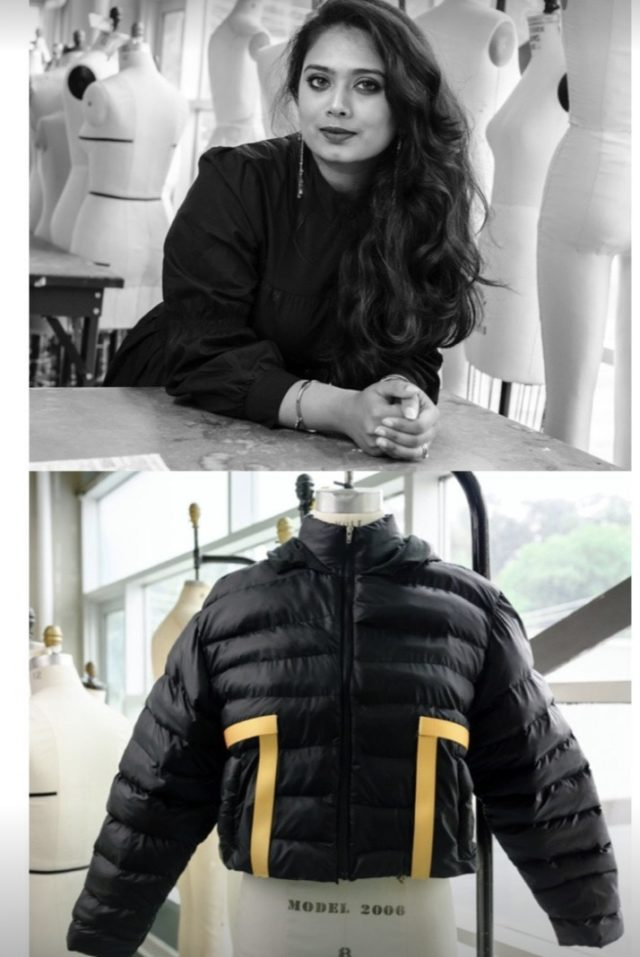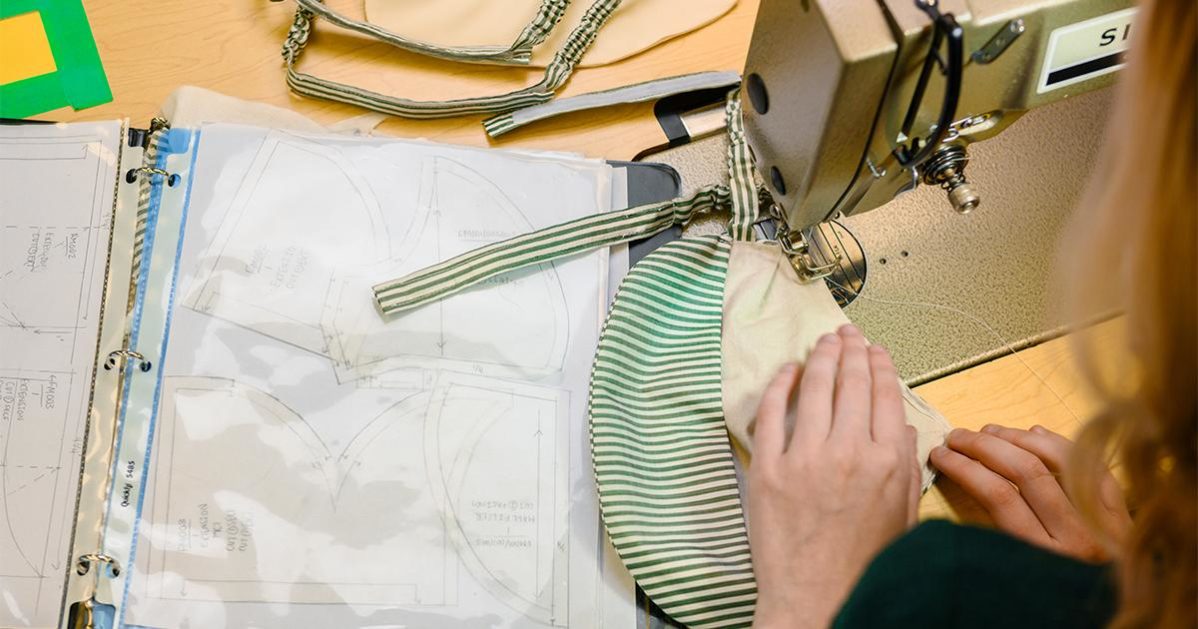Innovators are hardly deterred by obstacles – in fact, it is often in the face of adversity that they thrive. This is exactly what students from George Brown College’s (GBC) Centre for Arts, Design & Information Technology did in the demanding, nine-month-long MAKECanada contest which concluded this month.
MAKECanada is a multidisciplinary, inventive clothing design initiative hosted by GBC’s Centre for Arts, Design and Information Technology in collaboration with Robin Kay, a well-known expert in the Canadian fashion industry.
The contest required students to utilize their training, creativity and dreams to come up with design prototypes that not only look good, but also offer the function of protecting them from viruses such as COVID-19 and harmful elements from the environment. On top of this, the design concepts had to be sustainable.
My Mask by Sarah Jill DeCoste, PPE Puffer Coat by Vishali Sitharthan and HOPE Accessories by Sareh Ghomi and Mehrshad H. Naraghi were the three projects that emerged as victors of the contest after getting the green light from the panel of judges throughout different phases of the competition.
The winners will see their projects go into production in small batches at GBC’s fashion exchange and jewellery studios. The finished products will be available for sale at the School of Design’s INStore as part of the exclusive MAKECanada collection, just in time for holiday shopping.
Sarah Jill DeCoste and Vishali Sitharthan, two of the winners of the competition, spoke to the Dialog to share their experiences.
Sarah, a recent graduate from the Fashion Techniques and Design Program at GBC is exceedingly happy that instead of pursuing a degree in kinesiology as she had considered doing, ended up following her childhood dream of getting into fashion design.
“My earliest childhood memory is sitting on my mom’s lap while she was sewing,” DeCoste said.

Sarah Jill DeCoste wearing her award-winning mask.
Fashion, however, is not DeCoste’s only passion. She enjoys combining the art of fashion with her interest in science.
DeCoste’s My Mask uses protective silk along with a lining made from SeaCell, a sustainable, algae-based biotextile, ensuring better comfort.
“What’s so special about this fabric is that when it detects moisture, the fabric emits nutrients and vitamins on to the skin. This material also has antibacterial and anti-odour properties in it,” said DeCoste.
“The vitamin C in the algae-based material is good for the skin and can help with skin conditions like acne,” she elaborated. According to DeCoste, this material is also considered to be sustainable. The inner lining of the mask is made with algae, whereas the outer layer is made with silk.
One of the biggest challenges of coming up this prototype was finding suppliers for the algae, DeCoste said. She had to get the supplies of these seaweed-based algae shipped from overseas.
DeCoste loved how the MAKECanada contest was designed in a way that allowed the participants the opportunity to collaborate with different professionals from the fashion industry, who provided valuable insights and suggestions to the contestants.
Sarah’s mask prototype comes in three variations to accommodate various needs. One of the designs focuses on offering greater functionality to people who wear hijabs. “I noticed that standard face masks don’t fit properly and are very uncomfortable for people who wear hijab,” she said.
The third type of My Mask is designed for people with beards and people who wear turbans. These prototypes also focused on providing more comfort and functionality to people who have mobility issues, DeCoste said.
“Everyone deserves to be comfortable,” she emphasized, noting the main motivation behind her designs.
Apart from being named as one of the winners of the contest, Sarah also recently landed a job with ALDO. As a key tip for success for current students
“Talent will only take you so far,” said DeCoste. “It’s your personality and drive that will make you go places.”
Vishali Sitharthan, designer of the PPE Puffer Coat, is a second-year student in the Fashion Techniques and Design program at GBC.
Sitharthan cares deeply about making fashion sustainable. The Gaia-Co Puffer Jacket that she designed uses the wastage material from PPE suits. She sourced unused material from PPE manufacturing facilities that would have been discarded after cutting out the necessary material.

Vishali Sitharthan and her puffer coat.
In her research, Sitharthan found out that used PPE suits in hospitals are either thrown away or burned, which has a negative impact on the environment.
Her original idea was to reuse material from PPE suits after they were used by sterilizing them. However, this presented the additional challenge that many people might be reluctant to wear anything made from recycled PPE suits.
Instead, the solution that Sitharthan came up with after consulting with her mentor in the contest was to use recycled PPE as a stuffing inside the puffer jacket so that the material does not come into direct contact with the wearer’s skin.
Her prototype also uses recycled plastic bottles to make the outer layer of the jacket, with the added benefit of making the jacket water resistant and insulated.
Becoming a fashion designer has been a lifelong dream for Sitharthan. She used to design lehenga, a traditional Indian dress for her mom and neighbours, as well as her own clothes whenever she could.
Sitharthan also has a master’s degree in Fashion Design from the Academy of Art University in San Francisco. However, it is her current GBC program that she feels has been instrumental in giving her the necessary perspective and preparedness to try breaking into the fashion industry.
“I felt that I needed to learn more skills to be ready enough to go on the field,” Sitharthan said. “As Canada is a new country for me, everything is new, and getting into the fashion industry here seems hard.”
Breaking into the fashion industry seems very daunting to Sitharthan, particularly as she has perfectionist tendencies. “But my GBC program helped me a lot in becoming more confident,” she said. This confidence motivated her to enroll in the MAKECanada contest.
Sareh Ghomi, trained in the School of Fashion & Jewellery at GBC, collaborated with her partner Mehrshad Hajabdolazim Naraghi to design the third winning project: HOPE Accessories.
Their designs aim to alleviate the mental and emotional toll of living during the pandemic. The beads, charms and other accessories they have designed incorporate the word “Hope” to encourage positivity during the hardships of living during the pandemic.
Registration for the 2021/2022 edition of the MAKECanada contest will be open soon. Visit
https://makecanada.org for more information.


